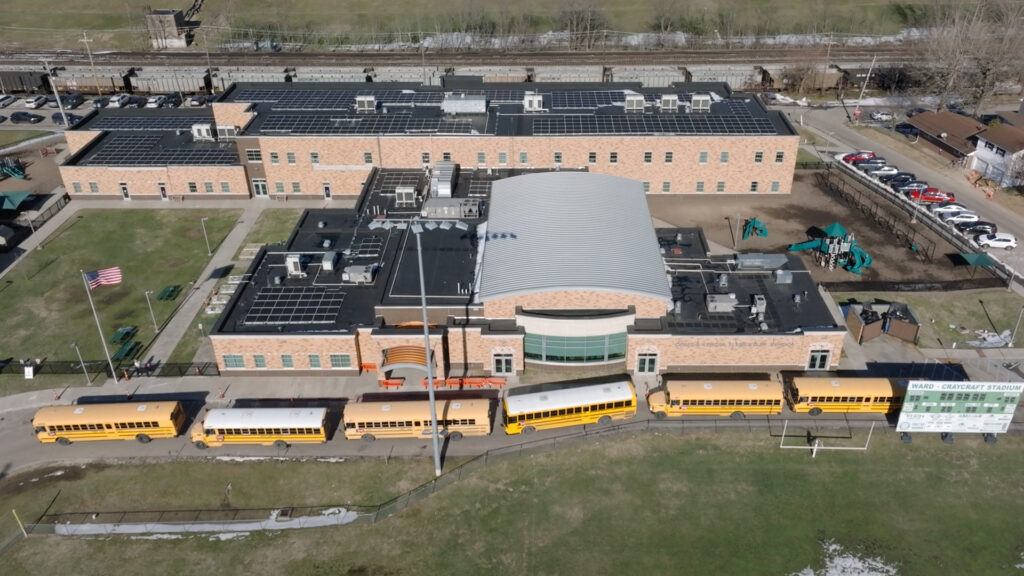There’s coal transportation on three sides of Ceredo-Kenova Elementary School. That includes rail lines on all three sides. Parallel to one of them, barges carry coal on the Ohio River.
Coal dominates electricity production in West Virginia, as it has for decades. But this school, and the surrounding Wayne County School District, is trying on a different kind of power – solar.
You can’t see it from the ground, but nearly 400 solar panels line the roof of the eight-year-old school, built on the site of an old high school.
Superintendent Todd Alexander says the solar panels could save the district a substantial amount of money on its annual electric bill. Electricity rates have been rising in Appalachian Power’s West Virginia service territory. While much attention has focused on impacts to residential customers, schools pay more, too.
“I don’t have the numbers on Ceredo Elementary School specifically, but if you look district wide, those savings are estimated to be about $200,000 a year that we would save in utility cost,” he said. “Now that was before any rate increases. With some of the proposed rate increases that are that are on the table right now, that number could go up significantly.”
But the school still receives power from the grid. That’s because the district entered a power purchase agreement with Appalachian Power, an arrangement made possible by state lawmakers in 2020.
A local company, Solar Holler, installed the panels on the school’s roof last year. The power they generate goes to the grid, and the school receives a credit for that power. Alexander says there was very little up-front cost, really just the fees for some attorneys to review the agreement.
“We’re still paying for the solar that we’ve collected,” he said. “It’s just cheaper than what we would pay for what we would get off the grid.”
In spite of coal’s lasting footprint in the community, Alexander says there was very little concern about the perception that the project would displace coal jobs. In fact, he says, some of the parents of the students at the school work installing solar.
“And I think it’s because Solar Holler operates in the West End Huntington, which is in Wayne County,” he said. “So they are a local employer.”
The school’s solar system was activated in early January. Then, several inches of snow, and some ice, fell across the region. Temperatures stayed cold. The snow covered the solar panels.
Thomas Ramey, commercial and nonprofit solar evaluator at Solar Holler, says winter weather is factored into how much power the panels can produce. Though winters have generally been mild for several years, he says the calculations have proved to be pretty accurate.
Alexander notes that the panels will generate electricity even when the school is out on break.
“We’re going to be collecting power year round, including it in the summer,” he said. “All of that is banked.”
Principal Deidre Farley says the installation occurred during the school year, with hundreds of students in the building. It was not as disruptive as anyone expected.
“That was what the teachers were concerned about, was the noise level,” she said. “And there was just maybe one day that I can remember that we heard some noise, but other than that, we didn’t even hear them.”
Farley says solar power even became part of the curriculum.
“Some of the students knew what was going on, and they had questions, and we would answer,” she said. “Some of the teachers did lessons on solar power and that type of thing.”
Alexander says older students in the district are learning about solar with an eye toward a potential career.
“We have a district internship program that they participate in,” he said. “We have high high school students from Wayne High School and Spring Valley High School and Tulsa High School that have access to an internship program through Solar Holler, where they’re working for them.”
With minimal up-front cost, working with a local company and the opportunity for students to learn trade skills that could build a career, Alexander says he had every reason to say yes.
“So with those factors, it was a no brainer, just to go ahead and move forward with it,” he said.
Solar Holler is an underwriter of West Virginia Public Broadcasting.
This story was distributed by the Appalachia + Mid-South Newsroom, a collaboration between West Virginia Public Broadcasting, WPLN and WUOT in Tennessee, LPM, WEKU, WKMS and WKYU in Kentucky and NPR.






















